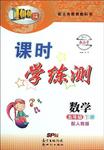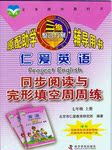CDBCA DBABC DAACD BABDC
1.C:四个选项含义分别为知道、明白、注意和确认,notice更符合句意。
2.D:as if 的意思是好像,
3.B:通过后文可以看出报纸应该是打开的,所以选open。
4.C:pretend to do sth 假装做某事
5.A:四个选项的意思分别为看见、发现、猜和学会。其中see比find更强调是自然地看见,而find有探索发现的意思。而我是很自然地看到他,所有选see更恰当。
6.D从前文看以看出我已经点了菜,是在等待上菜,menu含有菜单的意思,所以此处选择food更为恰当。
7.B: 四个选项的意思分别为直接的,相似的、陌生的和有趣的。从文中可以看出我和那个人的都很迷惑
8.A: 服务员和我应该是在简单的说几句话,而talk相对于chat来说更为正式,所以此处选a更恰当。
9.B:四个选项分别指的是服务员、时间、我和宴会,在此看以看出应该是时间的流逝。
10.C四个选项的意思分别是真实的、有希望的、清楚的和可能的,clear更符合句意。
11.D本题采用排除法解答比较好,因为本身就在饭店里所以排除A,也不可能去洗澡间和办公室,只有去厨房最为合理,后文也提到那个人去了厨房。
12.A那个人付了帐后应该是离开, leave的过去式是left,所以应该选A,
13.A四个选项的意思分别为想要的、尝试的、订制的和希望的,只有wanted更符合句意‘
14.C:followed 是跟随的意思。因为那个人是侦探,他遇到我肯定是跟随而来。
15.D:look for 是寻找的意思,从文中可以看出这个侦探是在寻找嫌疑人。
16.B:surprise是吃惊的意思,因为我刚才并不知道这个人是侦探,所以吃惊。
17.A:must是必须地意思,因为从文中可以看出我和侦探寻找的那个人很相似。
18.B:make a mistake 犯了个错误。从文中看出那个侦探确实是搞错了。
19.D:lucky 幸运的。通过后文看以看出我是幸运的
20.C: Otherwise是否则的意思。真是因为老板认识我,我才免去了这一场麻烦。



 百年学典课时学练测系列答案
百年学典课时学练测系列答案 仁爱英语同步练习册系列答案
仁爱英语同步练习册系列答案